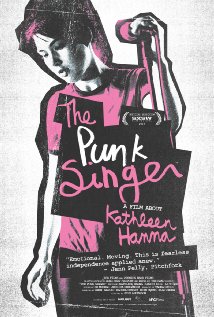|
|
The Punk Singer (ICA Film Review)
Article written by
Holly W - May 28, 2014
|
|
|
Having had a ticket to the postponed The Julie Ruin gig the night before, I was pleased to catch a screening of this Kathleen Hanna documentary, currently on limited release in the U.K.
Many reviews have called 'The Punk Singer' an unabashed love letter of sorts to Hanna. Hanna who was instrumental in the rise of riot grrrl and best known as lead vocalist for the dynamic Bikini Kill, and subsequently singer with Le Tigre and The Julie Ruin - the extended band set up of an original solo project. The one-sided comments are fair, however the film works for that reason. This is about Hanna; it is not a 'Behind The Music' style expose of Bikini Kill. It is a story of standing up for your beliefs, of comaraderie, of respect, of connection, of oppression, of illness (Hanna has late stage Lyme disease), of love, and some incredibly powerful, innovative, and important music.
Truly inspiring is the footage of Hanna defiantly standing her ground at an early Bikini Kill gig, whilst a stonefaced, seemingly aggressive male, stands in the front row inches from her face. The stories of hatred and vitriol discussed in this film (including anecdotes from Joan Jett, Kathi Wilcox and Kim Gordon) are genuinely sad and shocking. Powerfully, these women, notably Tobi Vali of Bikini Kill, created a channel of communication using zines, spoken word, art and music, whilst incorporating the feminist influences that came before them to combat their personal and collective negative experiences.
It is crucial to note, however, the positive impact of the men in Hanna's world, which is often left out of her story. In fact some of the most moving segments of the film relate to her friendship with Kurt Cobain, and her longstanding and supportive marriage to Adam Horowitz, who himself appears in the film.
A chronological telling of Hanna's story to date, it is easy to get caught up in past 90's nostalgia, a current trend sweeping across books, fashion and reissues. The progression of Hanna's music styles and politics, displayed through her various bands, disputes that, instead showing growth, and this is not a film about past glories. Very relevant. Very necessary.
|
|
|
|
|
|



